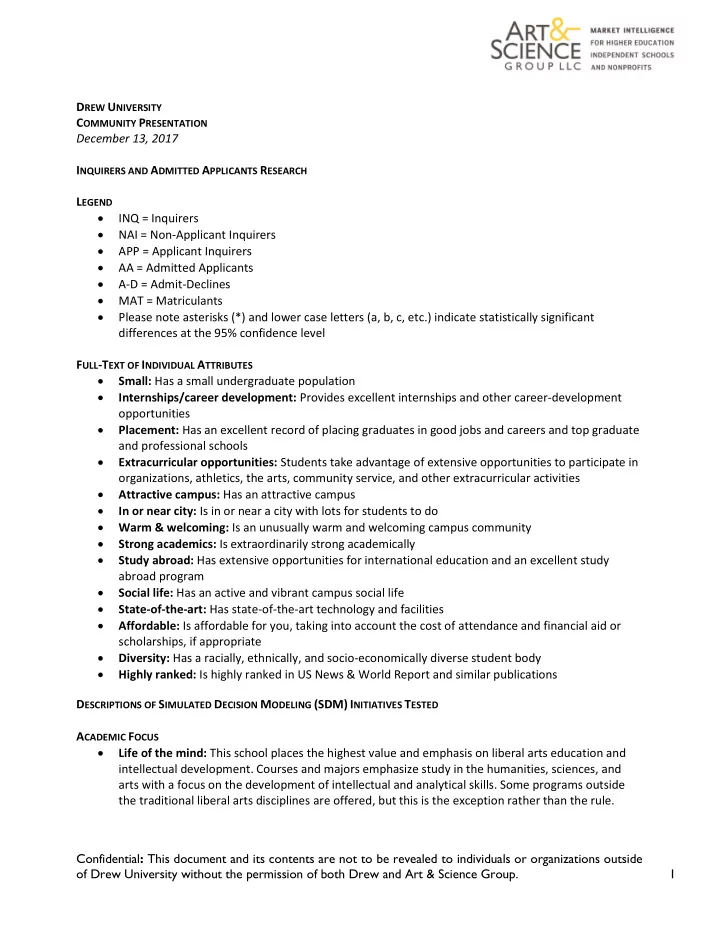

Art & Science Group D REW U NIVERSITY C OMMUNITY P RESENTATION December 13, 2017 I NQUIRERS AND A DMITTED A PPLICANTS R ESEARCH L EGEND INQ = Inquirers NAI = Non-Applicant Inquirers APP = Applicant Inquirers AA = Admitted Applicants A-D = Admit-Declines MAT = Matriculants Please note asterisks (*) and lower case letters (a, b, c, etc.) indicate statistically significant differences at the 95% confidence level F ULL -T EXT OF I NDIVIDUAL A TTRIBUTES Small: Has a small undergraduate population Internships/career development: Provides excellent internships and other career-development opportunities Placement: Has an excellent record of placing graduates in good jobs and careers and top graduate and professional schools Extracurricular opportunities: Students take advantage of extensive opportunities to participate in organizations, athletics, the arts, community service, and other extracurricular activities Attractive campus: Has an attractive campus In or near city: Is in or near a city with lots for students to do Warm & welcoming: Is an unusually warm and welcoming campus community Strong academics: Is extraordinarily strong academically Study abroad: Has extensive opportunities for international education and an excellent study abroad program Social life: Has an active and vibrant campus social life State-of-the-art: Has state-of-the-art technology and facilities Affordable: Is affordable for you, taking into account the cost of attendance and financial aid or scholarships, if appropriate Diversity: Has a racially, ethnically, and socio-economically diverse student body Highly ranked: Is highly ranked in US News & World Report and similar publications D ESCRIPTIONS OF S IMULATED D ECISION M ODELING (SDM) I NITIATIVES T ESTED A CADEMIC F OCUS Life of the mind: This school places the highest value and emphasis on liberal arts education and intellectual development. Courses and majors emphasize study in the humanities, sciences, and arts with a focus on the development of intellectual and analytical skills. Some programs outside the traditional liberal arts disciplines are offered, but this is the exception rather than the rule. Confidential : This document and its contents are not to be revealed to individuals or organizations outside of Drew University without the permission of both Drew and Art & Science Group. 1
Art & Science Group Pragmatic liberal arts: This school attracts students who want to focus on their intellectual development, but also want to spend a significant part of their time focusing on areas that are directly related to their career interests. All students choose both a major and a minor or choose to double major, and most make those choices by selecting a “passion” field of study (a subject they are passionate about) and a “professional” field of study (a subject that has direct practical value for the student’s career and professional development). For example, a biology major might decide to minor in healthcare administration, or a business major might decide to pursue a minor in art history. Professional + liberal arts: While the curriculum at this school is built on a strong foundation in the liberal arts, the educational experience is largely focused on the development of professional competencies and technical skills. Most students choose one of the many career-oriented majors that are offered, such as business, health sciences, communications, and technology, and the academic focus is on preparing students particularly well for the professional world when they graduate. Mostly professional: While this school may offer some programs in the liberal arts, nearly all students are enrolled in pre-professional majors and minors, such as business, health sciences, communications, technology, or engineering (not shown for Drew). L EARNING E NVIRONMENT Small classes with mentoring focus: Students and faculty choose this school because they want to be in an exciting learning environment in which close faculty-student interaction is a primary focus and mode of learning. Courses at all levels and in all subjects are taught in small groups of no more than 20 students, whether in classrooms, labs, studios, or elsewhere on or off campus. Faculty are passionate about helping students learn and grow, both in and outside of the classroom and in formal and informal interactions. This allows close collaborative mentoring relationships to develop between faculty and students and between students and their peers. Traditional with mentoring focus: At this school, the campus atmosphere is infused with passion and excitement for teaching and learning. Faculty choose to teach at this school because they are dedicated to helping students learn and grow, both in and outside of the classroom and in formal and informal interactions. Introductory courses tend to be larger, with some offering smaller class, lab, or studio sections that meet separately. Higher-level classes are often smaller. Traditional: At this school, faculty are inspired by the material they teach and the opportunity to share it with students, and students enjoy engaging with faculty and the subjects they learn, primarily in the classroom, but also outside of the classroom. Introductory courses tend to be larger, with some offering smaller class, lab, or studio sections that meet separately; higher-level classes are often smaller. P OST -C OLLEGE P LANNING Universal and integrated: Attention to post- college aspirations is integrated throughout a student’s experience at this college. Starting in their first year, students work with teams of faculty, career counselors, and/or mentors on an individualized, structured, four-year exploration of their interests and talents, thinking deeply about how those interests might relate to careers and potential areas of study. All students, whether they already have a career path in mind or are searching for one, explore different options and participate in internships, independent research or research with Confidential : This document and its contents are not to be revealed to individuals or organizations outside of Drew University without the permission of both Drew and Art & Science Group. 2
Recommend
More recommend